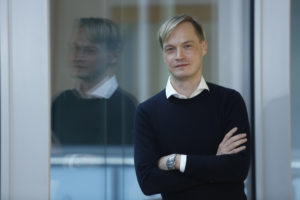ERC funding for the Angiogenesis & Metabolism Laboratory
Michael Potente receives a 2-Million-Euro grant from the European Research Council
Cardiologist Michael Potente, head of the research group “Angiogenesis and Metabolism” at the Max Planck Institute for Heart and Lung Research in Bad Nauheim, Germany, is awarded one of the prestigious Consolidator Grants of the European Research Council (ERC). Over the next five years, the ERC will provide the scientist with two million Euros for his research on blood vessels. Potente has been successful for the second time with a project application to the ERC: In 2012 he was already awarded a Starting Grant.
The ERC’s call for proposals is highly competitive: only about one in ten of the submitted applications was approved. According to the ERC, the Consolidator Grant Program aims at “excellent scientists whose own independent working group is in the consolidation phase.”
Potente is primarily interested in a cell layer, which lines the interior of blood vessels. Previously, he has been able to show that these so-called endothelial cells have a unique metabolism that is critical for the growth and function of blood vessels. However, the endothelium differs from organ to organ: “In the brain, for example, endothelial cells are tightly connected and form the so-called blood-brain barrier, through which only certain molecules can pass. In contrast, the endothelium in the liver is very permeable and thus ensures the detoxification function of the liver”, says Potente.
However, it remains unclear how this organ-specific differentiation of endothelial cells is established. With the ERC funds, Potente aims to address this question and investigate the influence of the tissue milieu on the specialization of endothelial cells. His goal is to examine the relationship between metabolism, epigenetics (non-inherited change of genes) and cellular differentiation. “We suspect that organ-specific differences in endothelial metabolic state promote specialization through altered epigenetics and thus contribute to diversity within the vascular system,” explains Potente.
A particular focus of Potente’s research project will be on potential changes in vascular endothelial function associated with obesity and aging. “We want to explore which metabolic products alter epigenetic programs in a way that the endothelium no longer functions properly and, in the worst case, the organ fails,” says Potente. Their research could thus contribute to a better understanding of vascular diseases caused by changes in metabolism.
Official press release by the ERC & highlighted projects.










